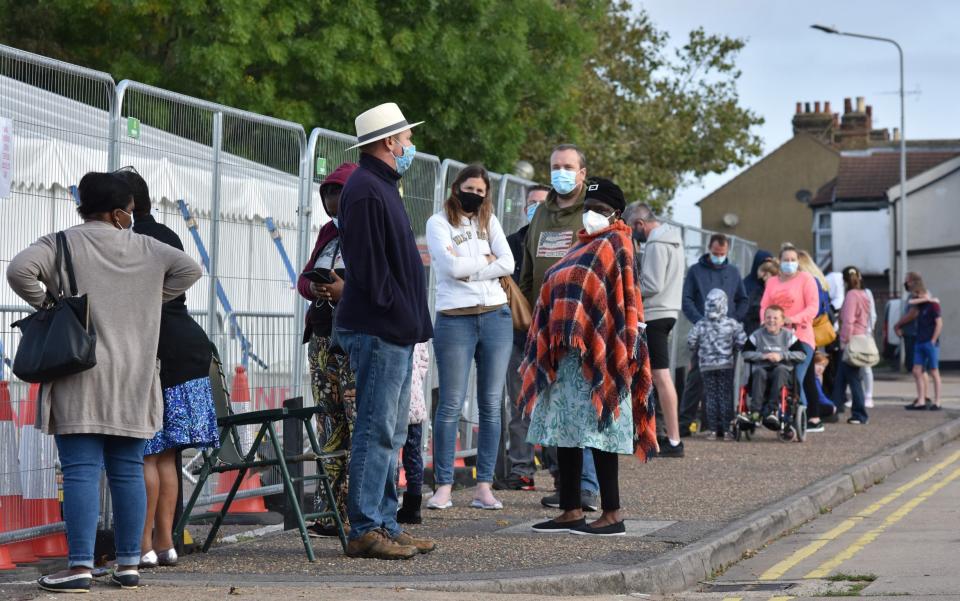Children with a runny nose do not have coronavirus, expert insists, as demand for tests soars by 150%

Children with a runny nose do not have coronavirus and should not be getting tested, an expert has warned, as demand soared by 150 per cent.
Prof Tim Spector, who developed the Covid-19 symptom tracker app, revealed that children under 18 displayed a completely different array of symptoms to adults and that if they had a cough or congestion were almost certainly suffering from the common cold that is sweeping through schools.
As the testing system buckles under the strain, Prof Spector said that parents should be aware of the symptoms specifically attributed to children before they take them out of school and tear up and down the country in search of a test.
“Kids really don’t seem to lose that sense of smell and they also don’t seem to get the cough and shortness of breath as much either,” he said.
“So it’s a different picture at different age groups, presumably because the immune systems are behaving differently.”
Asked whether he was suggesting that parents of children with a cough and a sniffle should not be burdening the NHS, he said: “Certainly for the next few weeks, while the whole system is stretched and this major school cold outbreak goes, I think that’s the sensible advice.”

Prof Spector’s guidance contradicts that from the Department for Health, which continues to state that if a child has a new continuous cough, a high temperature or a change or loss to their sense of taste or smell they should be tested for coronavirus.
A letter circulated to all schools at the beginning of term outlined the same set of symptoms as the basis for getting a test.
The symptom tracker, which is used by four million people, has revealed that the majority of children who test positive for Covid-19 suffer from fatigue and a headache. Around half have a fever, while more than a third have a sore throat and a loss of appetite.
One in six children have an unusual skin rash while a third have none of the 20 potential symptoms listed on the app, suggesting they are asymptomatic.
By comparison, almost 90 per cent of adults have the virus report fatigue, while nearly three quarters have a headache and around half, a persistent cough and a sore throat.
Prof Spector wrote on Twitter that the Government appeared reluctant to widen the “meagre" list of symptoms in case it increased demand for testing, even though it was “inappropriate for children.”
It comes as official Government figures revealed that the number of tests booked for children aged between ten and 14 had increased by 150 per cent in the month to September 1.
In the same period, the number of children aged between five and nine who were tested soared by 138 per cent.
Tests booked for teenagers aged between 15 and 19 increased by 70 per cent and for those aged up to four by 56 per cent.
Matt Hancock, the health secretary, warned this week that people suffering from colds, as well as those who were not eligible for a test at all, were clogging up the system.
Prof Spector, professor of genetic epidemiology at King's College London, told BBC Radio 4’s Today programme that people over the age of 65 also displayed different symptoms to those of the rest of the adult population, and did not tend to lose their sense of smell.
He said that 80 per cent of people who tested positive in all age groups reported severe headaches and tiredness or fatigue in the first week of illness, suggesting that those symptoms should be prioritised.
"We have 6,500 new cases every day, which on a countrywide basis is still very small, so the chances are most people don't have Covid-19," he said.
“We have to realise that perhaps 98 per cent of the tests being done at the moment are actually wrong.”
He said that as the system had proved unable to cope with demand, it was important to start thinking about ways to exclude Covid-19 rather than relying on standard criteria.
“We’ve also shown some negative signs in our app so if you have a runny nose or congestion, or sneezing, that’s really a sign that you absolutely do not have Covid,” he added.

 Yahoo News
Yahoo News 
